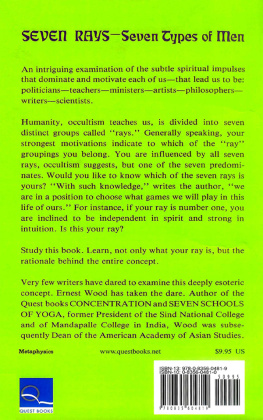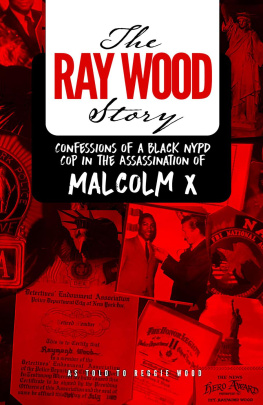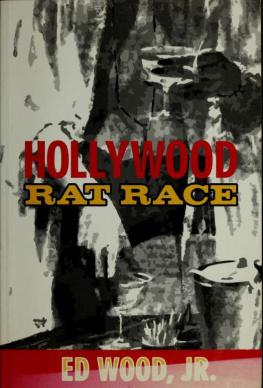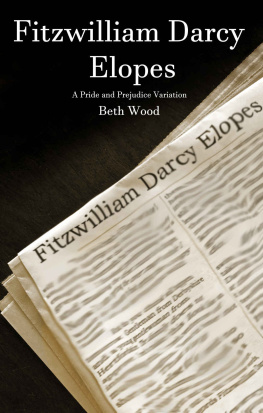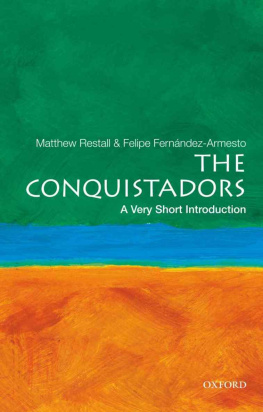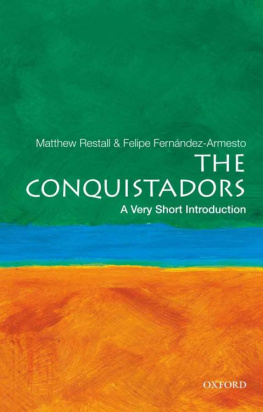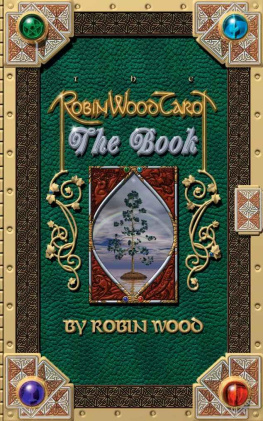Wood - Conquistadors
Here you can read online Wood - Conquistadors full text of the book (entire story) in english for free. Download pdf and epub, get meaning, cover and reviews about this ebook. year: 2015, publisher: BBC Books, genre: History. Description of the work, (preface) as well as reviews are available. Best literature library LitArk.com created for fans of good reading and offers a wide selection of genres:
Romance novel
Science fiction
Adventure
Detective
Science
History
Home and family
Prose
Art
Politics
Computer
Non-fiction
Religion
Business
Children
Humor
Choose a favorite category and find really read worthwhile books. Enjoy immersion in the world of imagination, feel the emotions of the characters or learn something new for yourself, make an fascinating discovery.
Conquistadors: summary, description and annotation
We offer to read an annotation, description, summary or preface (depends on what the author of the book "Conquistadors" wrote himself). If you haven't found the necessary information about the book — write in the comments, we will try to find it.
Wood: author's other books
Who wrote Conquistadors? Find out the surname, the name of the author of the book and a list of all author's works by series.
Conquistadors — read online for free the complete book (whole text) full work
Below is the text of the book, divided by pages. System saving the place of the last page read, allows you to conveniently read the book "Conquistadors" online for free, without having to search again every time where you left off. Put a bookmark, and you can go to the page where you finished reading at any time.
Font size:
Interval:
Bookmark:
About the Book
The Spanish conquest of the Americas in the 16th century was one of the most important and cataclysmic events in history. Spanish expeditions endured incredible hardships in order to open up the lands of the New World, and few stories in history can match these for drama and endurance.
In Conquistadors, Michael Wood follows in the footsteps of some of the greatest of the Spanish adventurers travelling from the forests of Amazonia to Lake Titicaca, the deserts of North Mexico, the snowpeaks of the Andes and the heights of Machu Picchu. He experiences the epic journeys of Cortes, Pizarro, Orellana and Cabeza de Vaca, and explores the turbulent and terrifying events surrounding the Spanish conquest of the Aztec and Inca empires.
Wood brings these stories to vivid life, highlighting both the heroic accomplishments and the complex moral legacy of the European invasion. Conquistadors is Michael Wood at his best thoughtful, provocative and gripping history.
About the Author
For more than 20 years, historian and broadcaster Michael Wood has made compelling journeys into the past, which have brought history alive for a generation of readers and viewers. He is the author of several highly praised books on English history including In Search of the Dark Ages, The Domesday Quest, In Search of England and In Search of Shakespeare. He has over 80 documentary films to his name, among them Art of the Western World, Legacy, In the Footsteps of Alexander the Great, Conquistadors and In Search of Myths and Heroes.
Michael was born in Manchester and educated at Manchester Grammar School and Oriel College Oxford, where he did post-graduate research in Anglo-Saxon history. He is a fellow of the Royal Historical Society.
CONTENTS

To Joaquin Garcia Sanchez and David Wallace
The age will come in the ripeness of time
When Ocean will loosen the chain of things
And bare new worlds to the storms.
Then a huge country will be revealed
and Thule will no longer be the last land.
SENECAS Medea, quoted by AUGUSTINE DE ZARATE in The History of the Discovery and Conquest of Peru, 1555
PROLOGUE: THE LORD OF THE SNOW STAR
Everything that has happened since the marvellous discovery of the Americas has been so extraordinary that the whole story remains quite incredible to anyone who has not experienced it at first hand. Indeed, it seems to overshadow all the deeds of famous people in the past, no matter how heroic, and to silence all talk of other wonders of the world.
BARTOLOME DE LAS CASAS A Short Account of the Destruction of the Indies, 1542
UP JUST BEFORE 3 A.M ., we gulp down several cups of hot coca tea and then each of us carefully packs a ball of coca leaves in the cheek. Outside the ground is white with frost. It is bitterly cold, and we cram on every available layer of clothing. A deep breath, then on with the rucksack. Hieronymo, the jolly horse-handler, has four helpers to carry the heavy gear, the tripod and boxes, though we have cut the shooting kit down to the minimum. I take the rucksack for my cameras, and soon regret it. Any extra weight becomes a struggle.
We start off at 15,000 feet, going up to nearly 17,000 on a steep rocky climb over a treacherous scree of boulders intersected by streams. The first few hundred yards from the camp are lung-bursting: you gasp in the freezing night air every few seconds and never seem to get enough, almost drowning in air. The night is cloudy, but a full moon, just on the wane, watery behind a thin curtain of cloud, helps to light our way. We stop every ten minutes for a rest, and in about an hour reach the foot of the glacier, the sacred ice that the pilgrims call in Quechua, the Inca language, Quoyllur Riti, The Lord of the Snow Star.
Coming up from below the glacier, the huge white mass of ice suddenly looms up under the deep blue night, framed between black crags like a still, pale monster. We stumble the last few yards down a rocky step to the very edge of the ice. Glistening, gently dripping, it almost feels alive. Rows of wax candles have been left under its lip, and little knots of people sit in silence, some praying, some just holding hands. Two women in traditional country dress with round fringed hats and huipils (tunics) sit by their candles, murmuring quietly.
Our guide immediately goes down into the trough by the ice edge, touches the ice with his forehead, salutes and embraces it, scattering coca leaves across its surface. Then he gestures with his feathered walking stick, and strokes the ice once more, mouthing a little prayer in Quechua to the apu, the spirit of the mountain. It is a magical moment, made all the more poignant by the plaintive sound of pipe, accordion and drum somewhere out in the darkness.
Higher up on the glacier, there is a magnificent view in the pre-dawn light: black jagged peaks, streamers of snow lifting off their tops, while the first hints of dawn soften the deep blue of the night sky. Up the snow slopes, groups of dancers perform their rituals with the bear men in their animal skins and whips. This is the most ancient kind of worship here, pre-Spanish, pre-Inca even.
The light grows, the peaks are touched golden; shining streaks of light spread across the snow in the high ravines. There are scenes of great jollity brass bands and lilting songs. There is a snow slide on a steep part of the glacier and crowds have gathered, taking turns to whoosh down accompanied by loud whoops and cheers, one man cradling his euphonium. The sky is now an intense dazzling blue and around eight oclock the sun flashes over the top to roars from the crowd.
Up the glacier, hundreds of tiny dots are visible, people bringing back the most important souvenir: ice hacked out of the ice floe. To one side, lone pilgrims are loading blocks of ice on their backs just as they are depicted on the old Andean drinking cups, and in the pages of the sixteenth-century Andean chronicler Waman Poma. One of them stops and, with a gesture to the surrounding peaks, speaks to us:
These mountains are our apus, our spirits. We are a community from Paucartambo in the Sacred Valley. We come here every year. After we have been up on the ice, we head off on foot to Tayankani along that path up there, to a huaca, a holy rock, up to the west of the valley. We walk till midday tomorrow. This is what our ancestors have always done. These ceremonies are not to do with the Church.
More people had joined us now, and an old man butted in, speaking in Spanish: Ours is a true worship, though it is not to do with the Church. A third man, more educated, spoke:
We are told that when Inca Manco fought the Spanish at the time of the coming of the whites, he said this to the indigenous people: Dont forget the rituals of your ancestorsdo what you have to in public, but in private keep our old customs and ceremonies close to your hearts. And this we still do.
It was a theme we would encounter again and again in our journeys through the Americas in the footsteps of the conquistadors.
This book is about events which took place nearly 500 years ago. The Spanish conquest was one of the most cataclysmic events in history, events which, in a couple of generations, overthrew the last high civilizations which had arisen independently on earth; which saw Spanish expeditions endure the most unbelievable hardships to open up lands from Tierra del Fuego to the Carolinas. Few events, if any in history, match these for sheer drama, endurance, and the incredible distances covered. And the conquest is still within living history; its effects are still with us, working themselves out now across the globe.
Next pageFont size:
Interval:
Bookmark:
Similar books «Conquistadors»
Look at similar books to Conquistadors. We have selected literature similar in name and meaning in the hope of providing readers with more options to find new, interesting, not yet read works.
Discussion, reviews of the book Conquistadors and just readers' own opinions. Leave your comments, write what you think about the work, its meaning or the main characters. Specify what exactly you liked and what you didn't like, and why you think so.

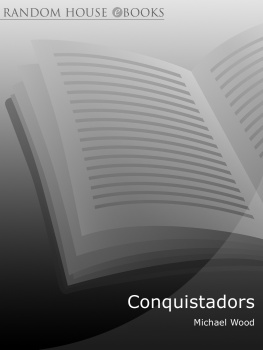



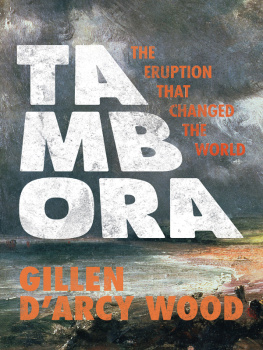

![Wood - Cia Rose Series Box Set [Books 1-3]](/uploads/posts/book/141420/thumbs/wood-cia-rose-series-box-set-books-1-3.jpg)

